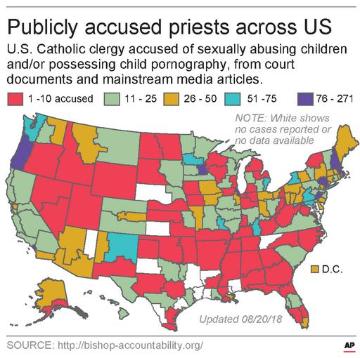
David DeCosse is the director of Campus Ethics at the Markkula Center for Applied Ethics. Views are his own.
The outrageous news in the last weeks about sexual abuse in the Catholic Church – the report by the Attorney General of Pennsylvania and the revelation of decades-long abuse by Cardinal Theodore McCarrick – challenges the idea of ethics itself in American society in fundamental and frightening ways.
First, there is the sheer difficulty of fully entertaining the harm that has been done. It’s almost more than we can bear: Children, teenagers, and young men and women preyed on by abusive clergy. We have to imagine the frightened faces of each victim as an encounter – wasn’t it supposed to be a fun outing to a lake with a friendly priest? – turns bewilderingly sexual. The repulsion of such intimate contact; the unspeakable confusion about whom to tell; the soul-crushing shame. Ethics is nothing if it is not finally a response to real human beings. We cannot turn away from great pain if we are going to have an ethics worth having.
Second, the news of the last weeks challenges us about the relevance of ethics at all. What’s the point of teaching ethics if doing so can’t stop people from deciding that a child inside a confessional is a fit subject for sexual pleasure? I’ll call this the challenge of cynicism – not because the question is necessarily cynical but because the real challenge here is fending off the descent into cynicism. A moment like this may point to an epic failure of ethics. But our very revulsion at what happened testifies to the enduring basis of ethics: our most fundamental intuitions of good and evil.
Third, ethics depends on institutions and we are in a full-blown crisis of institutions. We may have fundamental intuitions of good and evil. But where in society do we find the inspiring examples or time-honored practices or traditions of moral wisdom by which to shape these intuitions into a living, breathing ethics? There’s always been a decisive institutional role in such shaping. And one more such institution – this time the Catholic Church in the United States – has betrayed its own ideals and suffered a profound loss of moral authority. How can we re-imagine the institutions – women in leadership in the Catholic Church anyone? -- that will be central to an ethical future?
Fourth, ethics depends on hope in the face of ruin. At least in theory, the Catholic Church is one institution in our society that through its convictions about justice, love, and grace offers the possibility of hope. But what happens to broader society when such an institution itself betrays hope by refusing —or accepting only marginal—reform in the face of such an ongoing moral catastrophe? Catholicism has the resources to respond ethically to this crisis. But there are no guarantees it will do so. And the loss in society of the capacity to hope opens the door to the demagogues among us.
In 1992, while working at Doubleday, I edited the first major book detailing the extent of the sexual abuse crisis in the Catholic Church in the United States: Lead Us Not Into Temptation: Catholic Priests and the Sexual Abuse of Children by Jason Berry. That was ten years before the Boston Globe’s “Spotlight” series and 26 years before the report by the Attorney General of Pennsylvania. In a sense, the revelations of the last weeks aren’t new: They are pretty much all there in Berry’s courageous book and they raise more sharply now the same question they raised then: What is the point of ethics anyhow?
